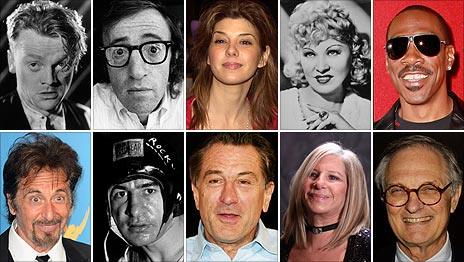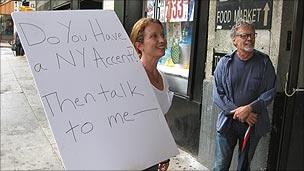Chronicling the many accents of New York
- Published

All of these famous people have or had New York accents
The twang of a New York accent is familiar to many around the world through Hollywood films. But with many believing it is now in decline, one woman is on a quest to record its full variety for posterity.
It's an unusually cold and rainy summer day in New York - the kind where many avoid going outdoors.
But Heather Quinlan is determined to find what she's looking for, so outside a subway stop in Brooklyn, she struggles with the wind to keep up her tattered, homemade sign.
It reads: "Do you have a NY Accent? Then talk to me."
For the last year-and-a-half, Quinlan, a native New Yorker and film-maker, has followed the same routine for her first documentary, If These Knishes Could Talk.
The film, part comedic banter and part serious discussion, will not only bring a taste of the NY accent to audiences, but also examine how it's changed as the city has changed.
"I have one grandfather who was a speech teacher and another grandfather who was a truck driver, and both are New Yorkers. And I feel like this film kind of bridges the gap between those two worlds a little bit," Quinlan explains.
Coffee, cabs and chocolate - as said in New York
"It's a bit of a way of honouring them - I miss hearing their accents. So it's sort of a way of preserving what I can of that speech before it goes away completely."
Linguists for decades struggled with the question of whether a city's accent could be defined, but Prof William Labov, who is the leading sociolinguist on New York dialects, has done just that.
According to Prof Labov, the NY accent originates from London.
"Back about 1800 all the major cities in the eastern seaboard of the United States began to copy the British pronunciation of not pronouncing the final 'r' as a consonant, saying 'caah' instead of 'car'.

Heather Quinlan wants to document the New York twang
"But New York didn't imitate London directly, there were quite a few changes in the vowels so that the New York City dialect began to go in its own direction still following that London pattern of r-less speech."
Another giveaway that someone is a New Yorker is their broadening of the vowel "a", saying "awe-ful" instead of "awful", for example.
While many New Yorkers believe the influx of Irish, Jewish, and Italian immigrants played heavily on the accent, Prof Labov says that this is not the case.
"A lot of people think that the migration from different parts of Europe is responsible for the speech that we hear in the big cities of the United States.
"But just the opposite is true. If your parents spoke Yiddish, Italian, Greek, Ukrainian, it's not going to have any particular influence upon the way you use NYC speech."
At the Clark Street subway station in Brooklyn, Quinlan has spoken to half a dozen people in just over an hour. Most regularly drop an "r", saying "wa-ta" instead of "water", and all say they don't hear the original New York accent spoken as often, especially not in Manhattan.
One man says it has to do with gentrification, another guesses it's the "cleaning-up" of the city, still others believe it's the influx of new immigrants.
Prof Labov says it has to do with a decline in the white mainstream speakers of New York City and the growth of the African-American and Hispanic population, who he says have their own unique dialect.
But even among white speakers the accent is less predominant. "There are some signs though that, especially among middle-class people, the New York City vernacular is starting to weaken and give way.
"A young person growing up in a college-educated household might, for example, complete the 'r' pronunciation even in his everyday speech," says Prof Labov.
But change is what New York City is all about. And while the city has changed for the better in many ways, Quinlan wants the world not to forget the tougher side of New York.
"People think New Yorkers are gruff and demanding and short-tempered and that's kind of how they feel about the accent, but once you get a bit underneath you realize that there is a lot of chutzpah and heart and character and that's what I want to try and come through."